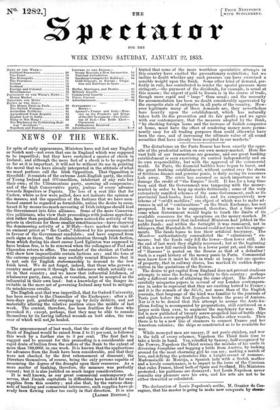The disturbance on the Paris Bourse has been exactly the
oppo- site of the prudential action on our own money-market. Here the vast bulk of our transactions are genuine, and our great banking establishment is seen exercising its control independently and on its own responsibility, but with the approval of the commercial world. In Paris, the financial bubbles have begun to burst, and the great banking establishment, without control over the storm of fictitious finance and genuine panic, is daily seeing its resources leak away. The crisis has assumed so much importance as to damage the credit of "the Empire" itself. It has for a long time been said that the Government was tampering with the money- market in order to keep up stocks fictitiously ; some of the very extensively ramified schemes of the same Government, such as its provincial land-banks, have failed ; and its comparatively new
scheme of "credit mobilier' " one object of which was to make ad- vances in aid of " continuations " on the Stock Exchange, has not prospered. It was to be supposed, therefore, that a time would come when Government would begin to touch the limits of its available resources for the operations on the money-market. Jr"
has long been averred that individual Ministers had jobbed ielhe public funds; and within the fortnight it was rumoured," not in whispers, that Marshal de St. Arnaud could not have met his engage- ments. The funds began to lose theii artificial buoyancy. The Moniteur authoritatively contradicted the " calumnious " ru- mours: but the funds only fell the lower—then lower still. At the end of last week they slightly recovered ; bat at the beginning of this, a new fall carried them to a lower point yet, and the name of " Bassano " is posted on the Bourse as that of a defaulter'. Such is a rapid history of the money panic in Paris. Commercial men know how it must be felt in trade at large ; but one species of property, that in railway shares, has marked its sudden depre- ciation in the quotations of the Bourse. The desire to get capital from England does not prevent studious attempts to raise the feeling of hostility to this country ; perhaps only a different mode of attaining the same object. The Moniteur carefully misquotes papers in several of our London contempora- ries in order to represent that they are exciting hatred to France ; and it is the remark of the Siècle, not more than of the sh
journals, that language of the kind was familiar to the journals of Paris just before the first Napoleon broke the peace of Amiens.
Nor is it to be denied that this attempt to arouse the Anti-An- glican feeling is accompanied by preparations, still continued on a larger scale than ever, to augment the machinery for war. The list is now published of twenty screw-propelled line-of-battle ships and eighteen screw-propelled frigates, besides other vessels. Then there is to be a new line of steamers to connect France and her American colonies; the ships so constructed as to be available for war. While moneyed men are uneasy, if not panic-stricken, and war is the talk of every schemer, Napoleon the Third finds time to take a bride in band. Yes, rebuffed by Saxony, half-recognized by the Powers Napoleon the Third revises the mistake of his uncle in divorcing Josephine and begging a bride from Austria, by looking around for the most charming girl he can see; making a match of love, and defying the potentates like a knight-errant of romance. Mademoiselle de 3fontijo, a Spanish lady with a Scotch mother and a lovely countenance, is to impart to the issue of the Corsican that rules France, blood both of Spain and Scotland. His Ministers protested ; his partisans are dismayed ; but Louis Napoleon never consults any pleasure save his own, and his acts are not to be either thwarted or calculated.


































